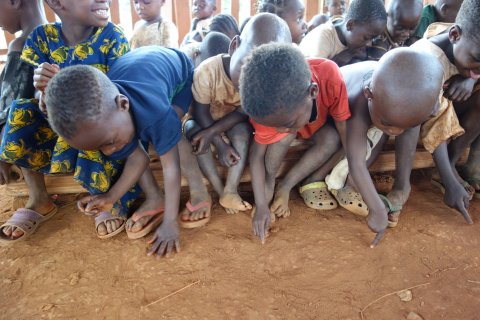Leading practitioners on early childhood development share learnings at Utrecht University
'Degbe Bide', or two little deer, is the name of a project in the Baka language, a group of hunter-gatherers in Cameroon. The name refers to one of the most common animals in the disappearing forests that the Baka call home. The Degbe Bide project works with young Baka children ages 3 to 6 to provide early childhood education based on best practises in a culturally adapted curriculum.
For two days last week, this project alongside the projects of 17 other organisations from around the world were hosted in the University Hall in Utrecht. All 18 organisations actively support early childhood development among poor and other children growing up in adversity from Brazil to India, from Rwanda to Bulgaria.

Hosted by the Utrecht Centre for Global Challenges and Dynamics of Youth, and in partnership with Porticus and Grand Challenges Canada Saving Brains, the two-day workshop brought together leading practitioners on early childhood development from all over the world.
Learn from experiences
The goal: to learn from the diverse experiences of these experts on how data, monitoring, and evaluation has helped them adapt their project designs and, in some cases, achieve national scale reaching tens of thousands of children. While the workshop allowed the teams to share experiences and explore common themes, the next step will be for each of the teams to prepare an academic journal article to be included in a special issue – open access - that captures this knowledge for a global audience.
For example, one kindergarten project called Springboard, run by the Trust for Social Achievement (TSA) in Bulgaria in collaboration with the World Bank, was designed as a randomized control trial (RCT) with almost national coverage. To increase kindergarten participation among poor children, Roma children in particular, the RCT found that removal of modest user fees was more effective than raising awareness among parents or providing them with financial incentives. But, explains Eugenia Volen from TSA: ‘To convince policy makers, we realized that we needed more than the scientific RCT evidence and decided to do a national poll to see if the public was supportive of removing kindergarten fees. Once politicians learned the answer was ‘yes’, we were able to mobilize support for scale up.'
Engaging stakeholders
This workshop is a nice example of the type of work that the Centre for Global Challenges would like to support within UU. As Professor of Economics Joost de Laat, co-host for this workshop, explains: ‘The Centre aims to be a platform where UU colleagues seek to confront global challenges in transformative ways by engaging stakeholders from around the world in a two-way dialogue. Not ‘sending’, but open and critical discussions with stakeholders, including experiments such as these, to learn and share knowledge in interdisciplinary ways. Ensuring that young children in adversity, where ever they are, have access to the same quality early childhood development opportunities as their better of peers is both an issue of equity and human rights, as well as simple economics: investing early gives the highest return on investment.’
‘Children in adversity need additional support’, De Laat continues. We are still figuring out how to do this well in different contexts. Each organisation here is in a way an experiment of practice. We hope to support them draw some very specific lessons that will inspire and inform others, through scientific publication, and contribute to the transformative change that everyone is working hard toward.’

